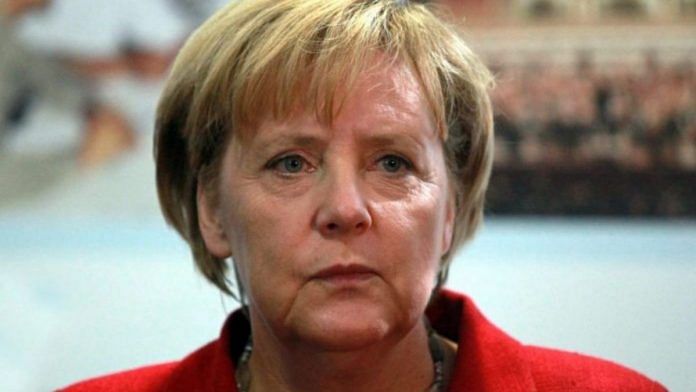Brussels: German Chancellor Angela Merkel delivered a wake-up call to fellow leaders in the 27-nation European Union, saying they all failed to step in quickly enough to control the pandemic as the cost of a second lockdown begins to come into focus.
Speaking by video conference Thursday, Merkel said that political realities stopped them from imposing restrictions earlier, and that they would have to draw lessons from the current situation and act faster in the future, according to officials with knowledge of her comments, who asked not to be identified because the meeting was private.
Countries in the EU, where more than 210,000 people have died from the disease and nearly 6.5 million have been infected, have begun to impose new restrictions in an effort to stem the crisis. Germany, the EU’s largest economy, will impose a one-month partial shutdown starting Monday, while France will enter a nationwide lockdown Friday.
The situation threatens to derail a nascent rebound from the steepest recession on record. The call came hours after European Central Bank president Christine Lagarde warned that the economy was losing momentum faster than expected, with the latest curbs expected to dampen output in the final quarter of the year. French Finance Minister Bruno Le Maire said economic activity may drop 15% during the restrictions.
“The lockdown measures should have come earlier,” said Guntram Wolff, Director of the Brussels-based Bruegel think tank. “We are now starting from very high levels.”
Governments across the bloc are coming face to face with the economic fallout from a second round of restrictions. The first lockdown in the spring already cost taxpayers trillions of euros.
If France can limit the drop in economic activity to 15% that would be half of the 30% drop in activity during the country’s first shutdown that started in March, Le Maire said, as he vowed there would be even stronger state support than during the spring confinement.
The French government will reactivate a solidarity fund for businesses affected by the new restrictions. The government estimates the cost to help companies affected by stay-at-home measures at 15 billion euros ($18 billion) per month.
“The companies have been weakened by the first wave, weakened by the climate of uncertainty, and they need our full financial and moral support. They have this support” Le Maire said.
Travel and Testing
The leaders’ summit was meant to underscore the need for harmonized action by member states in an effort to avoid repeating mistakes during the first wave of infections, when some countries closed borders, threatening the bloc’s single market and the flow of trade.
Merkel made clear during the call that internal borders within the EU need to stay open despite the pandemic. “Especially for Germany, as a country in the center of Europe, it is important that the borders stay open,” German government spokesman Steffen Seibert said in a statement following the meeting.
The leader’s videoconference was also meant to help national governments learn from one another and improve policy coordination. One idea leaders discussed was supplementing current testing practices with so-called antigen tests, which are less reliable but yield results within 15 minutes.
Following the call, European Commission president Ursula von der Leyen warned that the continent’s health care systems may soon be overwhelmed if governments don’t stop the spread of the virus. With some systems already stretched to their limits, she announced 220 million euros in funding for the cross-border transfer of patients.
Von der Leyen also urged member states to encourage the mass download of mobile contact-tracing apps. Eight months after the first outbreak, not all EU member states have such apps and most of the national apps that exist aren’t linked, rendering them useless when people cross borders. So far just over 10% of the EU population has downloaded contact tracing apps.
More Challenges
The economic consequences of the flare up in infections add to a series of challenges facing EU governments. France’s Emmanuel Macron joined the call just after the second terrorist attack in as many weeks rocked France.
He told leaders that his anti-separatism legislation, which sparked a backlash from Muslim countries, preceded the attacks and had been deliberately distorted by some media, according to two officials familiar with the conversation. Turkish President Recep Tayyip Erdogan has launched a personal attack on Macron and urged Muslims to boycott French goods.
Greek Prime Minister Kyriakos Mitsotakis told leaders in the call that the kind of rhetoric deployed by Erdogan that invites a clash of civilizations is a threat for Europe.
Mitsotakis himself is dealing with Turkish maritime claims in contested waters in the Eastern Mediterranean, and a flare up in virus infections that has tainted Greece’s stellar record in stemming the first wave of the outbreak last spring. –Bloomberg
Also read: Macron tempers tone on Islamic extremism after terrorist attack that killed 3 at Nice church



